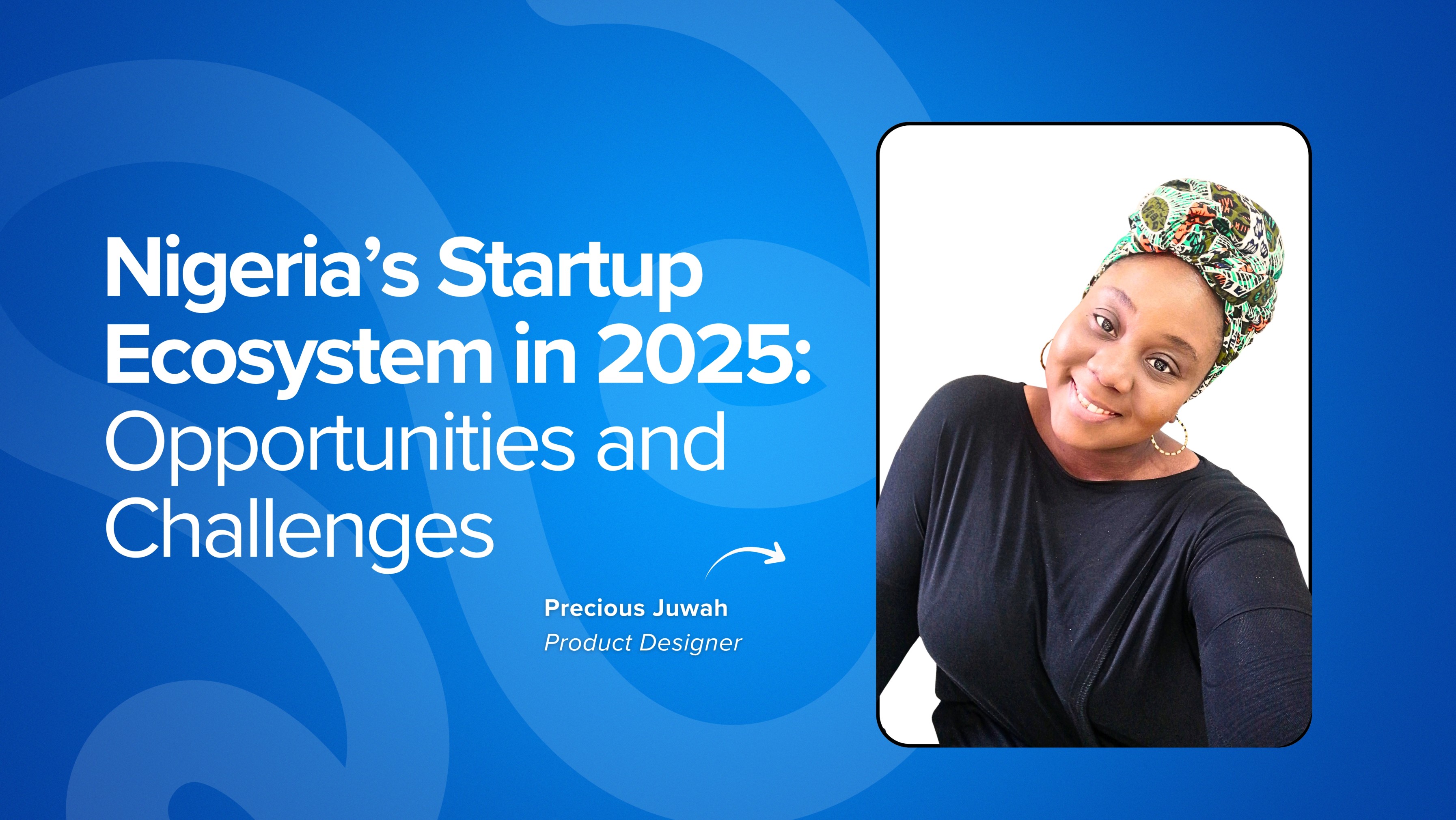07/11/20258 Mins read

In 2023, a founder pitched me on disrupting Lagos traffic with drone deliveries: a bold vision and no path to profitability. By 2024, she was back with the same idea and a different pitch deck. This time, she led with unit economics, regulatory partnerships, and a plan to break even.
That shift tells you everything about where Nigeria's startup ecosystem is heading.
After two years of working with startups across fintech, cooperatives, and digital services, I've witnessed the ecosystem shift from performative energy to something more durable. The chaos has not disappeared, but founders have stopped building against it. They are building with it, and this is making all the difference.
A few years ago, every pitch I read opened with "we are disrupting" something. Today, founders often start by discussing retention rates, customer acquisition costs, and compliance strategies.
The funding drought of the past two years forced a reckoning. Startups that relied on investor optimism had to confront their unit economics. Some folded, others pivoted hard, and the survivors learned to build lean.
What emerged is a new breed of founders who are pragmatic and not performative. Less interested in headlines, more obsessed with healthy balance sheets. They are asking more challenging questions before launch, not after the first million burns through.
As a designer, I see this shift in every product brief. Some founders now push back on feature bloat; they want MVPs that solve one problem exceptionally well, not platforms that promise everything. The discipline of choosing what not to build is the clearest sign of maturity in the ecosystem.
Fixing Broken Systems
The most exciting startups I see are not chasing hype. They are fixing infrastructure gaps that have plagued Nigerian businesses for decades.
Take payments, for example: a fintech client I worked with last year spent three months just mapping payment failure points across different bank APIs. Their solution was not pretty; it was middleware that ensured transaction reconciliation actually worked.
Boring? Absolutely. Necessary? Critical. Fundable? Very!
The biggest wins today lie in solving everyday inefficiencies: power distribution, last-mile logistics, identity verification, and supply chain transparency. These are not moonshots. They are the unglamorous foundation that lets other businesses scale.
Building with Data and AI Locally
AI is no longer just a buzzword; it is being localized. I see startups now use machine learning for credit scoring that factors in informal income patterns, fraud detection trained on Nigerian transaction behavior, and NLP models that actually understand Pidgin and code-switching.
Data fluency has become a competitive advantage. The startups winning right now are not just collecting data; they are using it to build adaptive systems that get smarter with every transaction.
Designing for Scale Beyond Nigeria
The most innovative founders are no longer building "for Nigeria"; they are building for Nigeria first, then scaling across Africa.
I have worked with payment startups that now bake regional interoperability into their architecture from day one. They are designing for multiple currencies, regulatory frameworks, and infrastructure realities simultaneously. It is harder upfront, but this is what investors want to see: proof that the solution travels.
According to recent African tech reports, cross-border deals now represent nearly 40% of Series A rounds. The market has noticed that Nigerian founders who think regionally from the start close bigger rounds, faster.
The Diaspora Advantage
A quiet but powerful shift. Diaspora-founded startups are bringing operational rigor that many local-only teams lack.
These founders bridge two worlds: they understand local market realities but also bring international investor expectations, compliance frameworks, and a disciplined go-to-market approach. They are not better founders; they are just starting with different defaults around reporting, governance, and strategic planning.
I have designed for both types of teams. Diaspora-led initiatives have more precise product roadmaps and stricter prioritization frameworks. That structure translates to investor confidence, especially in a cautious funding environment.
Policy Whiplash
A single government directive can kill entire business models overnight.
The Startup Act (2022) was a promising step: it offered tax breaks, regulatory sandboxes, and legal recognition for startups. But implementation remains inconsistent. In Lagos, startups can access some benefits. In other states, this infrastructure does not exist yet.
Until regulation becomes predictable, most founders build defensively. They avoid sectors where one policy shift could wipe them out. That caution limits innovation in critical areas like fintech and healthtech, where regulatory clarity matters most.
Capital is Cautious (and that is not entirely bad)
Funding has not disappeared; it is just more selective. Investors now demand proof: traction, not storytelling; revenue, not roadmaps.
Early-stage rounds are smaller, due diligence is longer, but here is the upside: the startups that do raise are building real businesses. The bar is higher, and that is making the ecosystem healthier in the long run. For founders, this means your pitch deck needs financial rigor, not just vision slides. Show how you will reach profitability, not just scale.
Talent Drain and the Global War for Skills
Nigeria's best product managers, engineers, and designers are increasingly global. They are taking remote roles with international companies that pay 3-5x local salaries.
Competing with that is brutal, but the founders who are adapting are getting creative: meaningful equity, flexible work arrangements, and mission-driven cultures. People still want to work on problems that matter; they just also want career growth and fair compensation.
From a design perspective, I tell founders: if you cannot compete on salary, compete on learning velocity. Build environments where people grow faster than they would anywhere else.
Infrastructure as a Design Constraint
Power outages, unreliable internet, and fragmented logistics. These are not background issues; they are daily realities that shape every product decision.
But the mindset has shifted. Startups now design around constraints: Solar-powered office setups, distributed teams across multiple regions for redundancy, offline-enabled product architectures, and Hybrid operations that do not depend on any single infrastructure point.
Imagine building an entire SaaS platform that syncs data in the background whenever power returns: users never see a loading screen. That is the kind of adaptive design thinking that defines this ecosystem.
Constraint is no longer just a problem to solve; it is a feature to design around. Adaptability has become a core competency!
If you're building in Nigeria right now, here is what the landscape demands:
Design for sustainability first. Investors want to see a path to profitability within 18-24 months. Show them your unit economics from day one.
Think regionally, not locally. Build products that can scale across African markets. Incorporate this flexibility into your architecture early.
Embrace boring infrastructure plays. The most significant opportunities are not flashy. They are in the logistics, identity, payments, and power sectors that enable other businesses to grow.
Compete on clarity, not hype. Your pitch needs financial discipline, market proof, and a realistic roadmap. The era of storytelling without substance is over.
The most exciting thing about Nigeria's startup ecosystem today is not the funding announcements or the unicorn dreams. It is the quiet shift in how founders think. We have stopped waiting for perfect conditions; we have learned to build with constraints, not against them; and we have discovered that discipline, not disruption, is what scales.
The next phase of growth will not be defined by hype cycles. It will be shaped by founders who deeply understand their markets, operate with rigor, and execute consistently.
There is still a long road ahead. Policy uncertainty will persist. Infrastructure will test us daily. Capital will remain selective.
But the progress is undeniable. Nigeria's startup ecosystem is not just surviving turbulence; it is evolving through it. The chaos has not disappeared, but the clarity is finally emerging, and this is precisely where real innovation thrives.
Precious Juwah is the Founder of Feisteez Design Limited — a product design and strategy firm helping startups build intuitive, scalable systems that truly work.
She partners with early and growth-stage companies across Nigeria’s fintech, cooperative, and digital services sectors, turning complex ideas into simple, purposeful products that solve real human problems and drive business growth.

Ever wondered why so many tech giants are turning their gaze toward Africa for software development talent?
10/06/2024 | 12:43 PM
By Yetunde Hassan

When it comes to job models, the world has turned a new page. The door to remote and hybrid work has opened and will likely remain open indefinitely.
12/03/2023 | 2:59 PM
By Yetunde Hassan

Hire vetted and smart African talents today

651 N Broad St. Suite 206, Middletown, DE 19709, USA

89 Monaco Court, Brampton, ON L7A 1X2, Canada

2nd Floor, 10 Hughes Avenue, Alagomeji, Yaba, Lagos, Nigeria.
Copyright © 2025. ProDevs Outsourcing Inc.